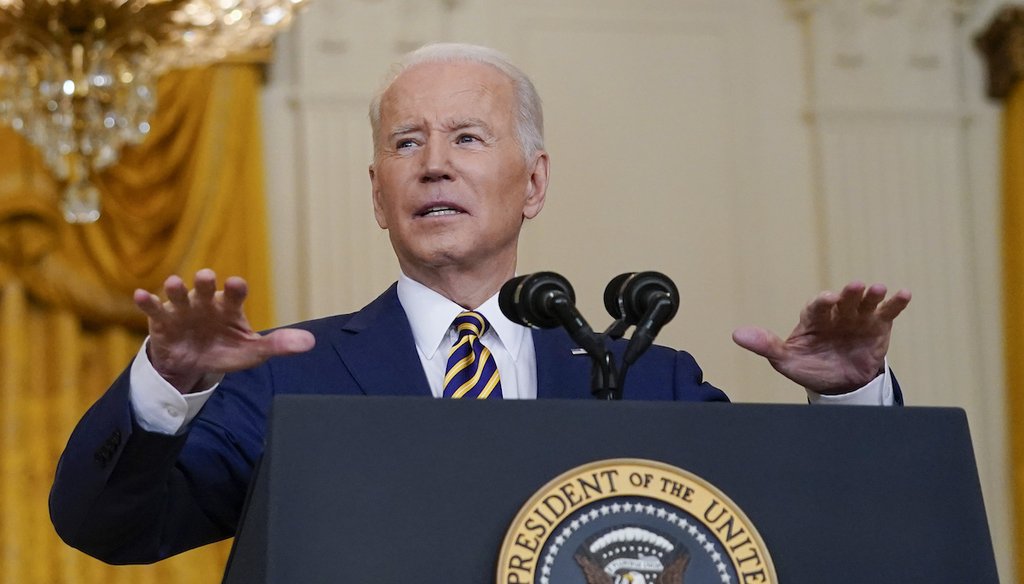Stand up for the facts!
Our only agenda is to publish the truth so you can be an informed participant in democracy.
We need your help.
I would like to contribute

President Joe Biden speaks during a news conference marking his first year in office in the East Room of the White House. (AP)
Biden’s boast about rising wages ignores effect of inflation
If Your Time is short
-
Typical weekly earnings rose to $1,008 in the fourth quarter of 2021, from $982 a year earlier.
-
After factoring in inflation, they fell $37.
-
Wage gains for lower-income workers nearly kept pace with inflation, but even they lost a bit of ground.
During his long session with reporters to mark his first year in office, President Joe Biden said he’d had both setbacks and wins. He counted wages as one of the wins.
"For the first time in a long time, this country’s working people actually got a raise," Biden said Jan. 19. "The people of the bottom 40% saw their income go up, the most of all the categories."
Here we focus on the heart of that statement, that "working people actually got a raise."
In simple dollar amounts, yes, earnings went up. But with inflation at a 40-year high, the real value of people’s paychecks went down. (Sen. Mitt Romney, R-Utah, had a similar problem — but from the opposite direction — weighing inflation against wage gains in a claim we fact-checked.)
Two different sets of government numbers tell the same story — inflation outpaced raises.
The Bureau of Labor Statistics tracks median weekly earnings for each quarter. And it gives the numbers in both current dollars — what people see on their pay stubs — and real dollars — the buying power after inflation.
In current dollars — unadjusted for inflation — the typical weekly paycheck was $1,008 in the fourth quarter of 2021, up from $982 a year earlier.
But in inflation-adjusted dollars, pay went down over that period to $945 a week.
The Federal Reserve shows similar trends for average hourly earnings. Between December 2020 and December 2021, average hourly earnings for private employees rose by 4.7%, which is a healthy increase by historical standards.
But inflation, as measured by the federal government’s Consumer Price Index, was 7% in that period. That was the biggest increase since 1982, when President Ronald Reagan was still in his first term in office.
Featured Fact-check
"Wages have increased substantially, but less than inflation," said Molly Kinder, a fellow at the Brookings Institution, a Washington-based policy research center. "Thus real wages have declined slightly."
The White House press office said Biden was talking about the nominal increase in wages. They noted that most economists expect inflation to ease, which would set the stage for real wage gains.
Biden also touted gains for lower-wage earners, "the bottom 40%." He said they did the best in terms of income gains.
BLS data showed that workers at the bottom quarter of the earnings ladder saw their incomes rise by 6.6%, nearly keeping pace with inflation.
But for the middle 50% of workers, earnings rose just about 2.6%. That lagged well behind inflation. The top 10% of earners saw a rise of 5.3%.
Workers at large companies did better, one survey found. Brookings took data reported by 13 large companies (ranging from Amazon to McDonalds) and found that through October 2021, workers at 10 of them saw wage gains even after accounting for inflation.
Biden said that "this country’s working people actually got a raise."
They did, with an overall increase of 4.7%. But with inflation at 7%, the average person lost ground in terms of real income. This was particularly true for the middle half of earners who saw a median wage increase of only about 2.5%.
The picture was a bit better for low-wage earners, but not enough to shift the broader pattern for 2021: Inflation outpaced wage increases.
We rate this claim Mostly False.
Our Sources
White House, Remarks by President Biden in Press Conference, Jan. 19, 2022
Bureau of Labor Statistics, Median usual weekly earnings, accessed Jan. 20, 2022
Federal Reserve Bank of St. Louis, "Average Hourly Earnings of All Employees, Total Private," accessed Jan. 20, 2022
Federal Reserve Bank of St. Louis, "Employment-Population Ratio," accessed Jan. 20, 2022
Federal Reserve Bank of Atlanta, wage tracker, accessed Jan. 20, 2022
Email exchange, Molly Kinder, fellow, Brookings, Jan. 18, 2022
Email exchange, Michael Gwin, director of rapid response, White House press office, Jan. 20, 2022
Browse the Truth-O-Meter
More by Jon Greenberg
Biden’s boast about rising wages ignores effect of inflation
Support independent fact-checking.
Become a member!
In a world of wild talk and fake news, help us stand up for the facts.























































